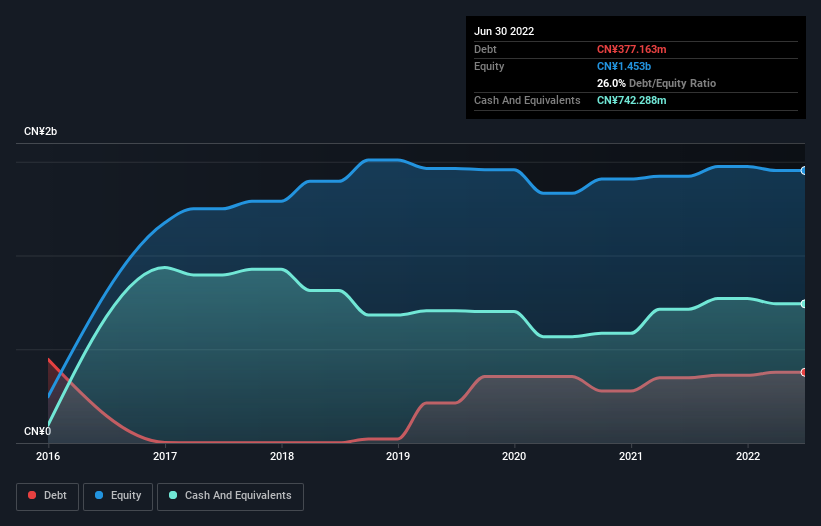- Hong Kong
- /
- Healthcare Services
- /
- SEHK:3689
Here's Why Guangdong Kanghua Healthcare (HKG:3689) Can Manage Its Debt Responsibly

The external fund manager backed by Berkshire Hathaway's Charlie Munger, Li Lu, makes no bones about it when he says 'The biggest investment risk is not the volatility of prices, but whether you will suffer a permanent loss of capital.' So it might be obvious that you need to consider debt, when you think about how risky any given stock is, because too much debt can sink a company. We can see that Guangdong Kanghua Healthcare Co., Ltd. (HKG:3689) does use debt in its business. But the real question is whether this debt is making the company risky.
What Risk Does Debt Bring?
Generally speaking, debt only becomes a real problem when a company can't easily pay it off, either by raising capital or with its own cash flow. Part and parcel of capitalism is the process of 'creative destruction' where failed businesses are mercilessly liquidated by their bankers. However, a more usual (but still expensive) situation is where a company must dilute shareholders at a cheap share price simply to get debt under control. Of course, the upside of debt is that it often represents cheap capital, especially when it replaces dilution in a company with the ability to reinvest at high rates of return. When we examine debt levels, we first consider both cash and debt levels, together.
Check out the opportunities and risks within the HK Healthcare industry.
How Much Debt Does Guangdong Kanghua Healthcare Carry?
The image below, which you can click on for greater detail, shows that at June 2022 Guangdong Kanghua Healthcare had debt of CN¥377.2m, up from CN¥348.0m in one year. However, its balance sheet shows it holds CN¥742.3m in cash, so it actually has CN¥365.1m net cash.

How Strong Is Guangdong Kanghua Healthcare's Balance Sheet?
We can see from the most recent balance sheet that Guangdong Kanghua Healthcare had liabilities of CN¥826.2m falling due within a year, and liabilities of CN¥418.0m due beyond that. Offsetting these obligations, it had cash of CN¥742.3m as well as receivables valued at CN¥291.9m due within 12 months. So its liabilities total CN¥210.0m more than the combination of its cash and short-term receivables.
Guangdong Kanghua Healthcare has a market capitalization of CN¥418.7m, so it could very likely raise cash to ameliorate its balance sheet, if the need arose. But we definitely want to keep our eyes open to indications that its debt is bringing too much risk. Despite its noteworthy liabilities, Guangdong Kanghua Healthcare boasts net cash, so it's fair to say it does not have a heavy debt load!
In fact Guangdong Kanghua Healthcare's saving grace is its low debt levels, because its EBIT has tanked 40% in the last twelve months. Falling earnings (if the trend continues) could eventually make even modest debt quite risky. When analysing debt levels, the balance sheet is the obvious place to start. But you can't view debt in total isolation; since Guangdong Kanghua Healthcare will need earnings to service that debt. So when considering debt, it's definitely worth looking at the earnings trend. Click here for an interactive snapshot.
But our final consideration is also important, because a company cannot pay debt with paper profits; it needs cold hard cash. Guangdong Kanghua Healthcare may have net cash on the balance sheet, but it is still interesting to look at how well the business converts its earnings before interest and tax (EBIT) to free cash flow, because that will influence both its need for, and its capacity to manage debt. During the last three years, Guangdong Kanghua Healthcare generated free cash flow amounting to a very robust 89% of its EBIT, more than we'd expect. That puts it in a very strong position to pay down debt.
Summing Up
Although Guangdong Kanghua Healthcare's balance sheet isn't particularly strong, due to the total liabilities, it is clearly positive to see that it has net cash of CN¥365.1m. The cherry on top was that in converted 89% of that EBIT to free cash flow, bringing in CN¥87m. So we are not troubled with Guangdong Kanghua Healthcare's debt use. There's no doubt that we learn most about debt from the balance sheet. But ultimately, every company can contain risks that exist outside of the balance sheet. For example Guangdong Kanghua Healthcare has 4 warning signs (and 2 which can't be ignored) we think you should know about.
Of course, if you're the type of investor who prefers buying stocks without the burden of debt, then don't hesitate to discover our exclusive list of net cash growth stocks, today.
New: Manage All Your Stock Portfolios in One Place
We've created the ultimate portfolio companion for stock investors, and it's free.
• Connect an unlimited number of Portfolios and see your total in one currency
• Be alerted to new Warning Signs or Risks via email or mobile
• Track the Fair Value of your stocks
Have feedback on this article? Concerned about the content? Get in touch with us directly. Alternatively, email editorial-team (at) simplywallst.com.
This article by Simply Wall St is general in nature. We provide commentary based on historical data and analyst forecasts only using an unbiased methodology and our articles are not intended to be financial advice. It does not constitute a recommendation to buy or sell any stock, and does not take account of your objectives, or your financial situation. We aim to bring you long-term focused analysis driven by fundamental data. Note that our analysis may not factor in the latest price-sensitive company announcements or qualitative material. Simply Wall St has no position in any stocks mentioned.
About SEHK:3689
Guangdong Kanghua Healthcare Group
An investment holding company, primarily operates private hospitals in the People’s Republic of China.
Excellent balance sheet low.


